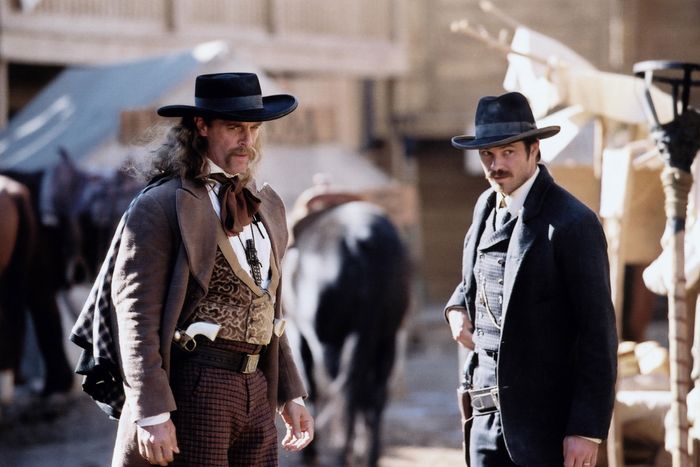
We’ve spent the past couple weeks rolling out 12 Days of Deadwood, our collection of recaps for the first season of David Milch’s HBO western — a show that no one ever needs an excuse to revisit, or watch for the first time. The series premiered in March of 2004 and became one of the greatest-of-all-time dramas despite having been cut short just three years into its run, for reasons that even students of TV history have been unable to fully parse. Set almost entirely within the confines of Deadwood, South Dakota during the gold rush of the 1880s, Deadwood plays like Our Town by way of a bloody revisionist Western. The show had a writing staff, but only to work out the plotlines. All of the dialogue was ultimately reworked and obsessively rewritten by Milch, usually on the fly and often on the same day that scenes were scheduled to shoot, with big changes being made according to what the actors and filmmakers were doing at that instant.
The result is a unique drama that’s set in another time but feels as if it’s happening right in front of you. That quality is furthered by the show’s quasi-documentary handheld photography, which at times gives the show the feeling of a live TV drama from the 1950s, but with horses, six shooters, f-bombs, graphic sex and violence, and torches and oil lamps providing the lighting. Milch’s ornate and often magnificently filthy language is not period accurate, exactly, although it’s true to the more poetic/literary way that people expressed themselves in the era before electronic media, when books basically were television. The gigantic ensemble furthered the stardom of veteran character actors like Ian McShane, Keith Carradine, William Sanderson and Brad Dourif, and gave decisive career boosts to up-and-comers such as Timothy Olyphant, Molly Parker, Kim Dickens, Jim Beaver, Robin Weigert, Dayton Callie, Ray McKinnon, and Paula Malcomson. All gave performances that rank among the strongest of their careers, and the vast majority have publicly stated that Deadwood was among the best, if not the very best, working experiences they’ve ever had, despite the chaos built into Milch’s wildly unconventional working methods.
A former Yale literature professor and scholar, Milch came to Deadwood after a twenty-plus year career in network television, the highlights of which were two groundbreaking cop shows, Hill Street Blues and NYPD Blue (respectively created and co-created by Steven Bochco). Both those series were about the workings of institutions and the individual’s place within them, and they centered most of their action on the police station. Deadwood adopted the same strategy but enlarged the scope to cover an entire town (called a “camp” in the early years). It foregrounded the concept of community, examining it in philosophical, political and theological terms, showing how law and order grew out of chaos, and how chaos continued to exist within the institutions that people created to manage the messiness of life. They’re themes that, like Deadwood in general, are always worth discussing, and so we did, over the course of a dozen posts. You can check out the show on HBO Max and then find the recaps here or below.


